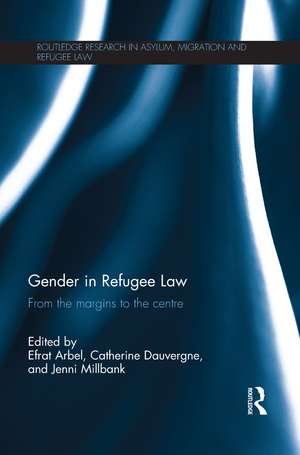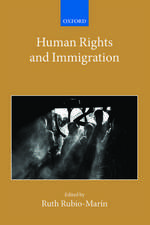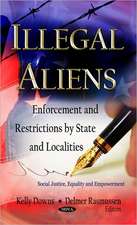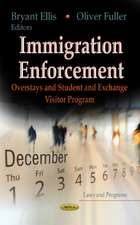Gender in Refugee Law: From the Margins to the Centre: Routledge Research in Asylum, Migration and Refugee Law
Editat de Efrat Arbel, Catherine Dauvergne, Jenni Millbanken Limba Engleză Paperback – 29 feb 2016
Evaluating the research and advocacy agendas for gender in refugee law ten years beyond the 2002 UNHCR Gender Guidelines, the book investigates the current status of gender in refugee law. It examines gender-related persecution claims of both women and men, including those based on sexual orientation and gender identity, and explores how the development of an anti-refugee agenda in many Western states exponentially increases vulnerability for refugees making gendered claims. The volume includes contributions from scholars and members of the advocacy community that allow the book to examine conceptual and doctrinal themes arising at the intersection of gender and refugee law, and specific case studies across major Western refugee-receiving nations. The book will be of great interest and value to researchers and students of asylum and immigration law, international politics, and gender studies.
| Toate formatele și edițiile | Preț | Express |
|---|---|---|
| Paperback (1) | 454.38 lei 6-8 săpt. | |
| Taylor & Francis – 29 feb 2016 | 454.38 lei 6-8 săpt. | |
| Hardback (1) | 1064.36 lei 6-8 săpt. | |
| Taylor & Francis – 17 apr 2014 | 1064.36 lei 6-8 săpt. |
Preț: 454.38 lei
Nou
Puncte Express: 682
Preț estimativ în valută:
86.95€ • 92.98$ • 72.49£
86.95€ • 92.98$ • 72.49£
Carte tipărită la comandă
Livrare economică 17 aprilie-01 mai
Preluare comenzi: 021 569.72.76
Specificații
ISBN-13: 9781138670419
ISBN-10: 1138670413
Pagini: 318
Dimensiuni: 156 x 234 x 17 mm
Greutate: 0.57 kg
Ediția:1
Editura: Taylor & Francis
Colecția Routledge
Seria Routledge Research in Asylum, Migration and Refugee Law
Locul publicării:Oxford, United Kingdom
ISBN-10: 1138670413
Pagini: 318
Dimensiuni: 156 x 234 x 17 mm
Greutate: 0.57 kg
Ediția:1
Editura: Taylor & Francis
Colecția Routledge
Seria Routledge Research in Asylum, Migration and Refugee Law
Locul publicării:Oxford, United Kingdom
Public țintă
PostgraduateCuprins
1. Introduction: Gender in Refugee Law: From the Margins to the Centre, Efrat Arbel, Catherine Dauvergne and Jenni Millbank 2. Why We Are Not There Yet: The Particular Challenge of ‘Particular Social Group’, Michelle Foster 3. Legal Change from the Bottom Up: The Development of Gender Asylum Jurisprudence in the United States, Deborah E. Anker 4. A Tale of Two Women: The Claims for Asylum of Fauziya Kassindja, who Fled FGC, and Rody Alvarado, a Survivor of Partner (Domestic) Violence, Karen Musalo 5. Falling at Each Hurdle: Assessing the Credibility of Women’s Asylum Claims in Europe, Debora Singer 6. Psychological Barriers to Fair Refugee Status Determination Related to Our Understanding and Expression of Gender, Jane Herlihy 7. Lesbians and UK Asylum Law: Evidence and Existence, Claire Bennett 8. Where Are the Women? 9. Human Trafficking and Refugee Women, Susan Kneebone 10. Women Fleeing Armed Conflict: Seeking International Protection in the United Kingdom, Christel Querton 11. Training and Strategic Litigation: Tools for Enhanced Protection of Gender-Related Asylum Applicants in Europe, Maria Hennessy 12. Gendered Border Crossings, Efrat Arbel 13. Evaluating Canada’s Approach to Gender-Related Persecution: Revisiting and Re-embracing ‘Refugee Women and the Imperative of Categories’, Shauna Labman and Catherine Dauvergne
Recenzii
"Overall, due to its inter-disciplinarity, Gender in Refugee Law is very accessible to a diverse readership. As the book discusses past developments as well as the current state of gender in refugee law, it is very informative for people new to, as well as those already familiar with, the topic". - Hannah Baumeister, Aberystwyth University for International Journal of Refugee Law (2014, Vol. 26, No. 4, 716–729)
"In order to dissolve the aforementioned dichotomy underlying the mainstream discourse about refugees, the ‘refugee producing countries’ must be given a voice in future studies, academic publications and advocacy situations. Gender in Refugee Law constitutes a milestone in this process, as it paves the way to further advances in refugee law – such as a study examining on the one hand how refugees find out about the asylum claim process, and on the other how governments and society view refugees (pp. 171-2). For this reason, scholars in anthropology and other social sciences, whose work is critical in the investigation of this issue, would find this book of particular interest in their endeavours. It not only shows how gender has been pushed from the centre to the margins of refugee law, but more importantly, it successfully proves the urgency of bringing it back to its former place." - Gabriela Rădulescu, Allegra Lab: Anthropology, Law, Art & World
"In order to dissolve the aforementioned dichotomy underlying the mainstream discourse about refugees, the ‘refugee producing countries’ must be given a voice in future studies, academic publications and advocacy situations. Gender in Refugee Law constitutes a milestone in this process, as it paves the way to further advances in refugee law – such as a study examining on the one hand how refugees find out about the asylum claim process, and on the other how governments and society view refugees (pp. 171-2). For this reason, scholars in anthropology and other social sciences, whose work is critical in the investigation of this issue, would find this book of particular interest in their endeavours. It not only shows how gender has been pushed from the centre to the margins of refugee law, but more importantly, it successfully proves the urgency of bringing it back to its former place." - Gabriela Rădulescu, Allegra Lab: Anthropology, Law, Art & World
Descriere
Questions of gender have strongly influenced the development of international refugee law over the last few decades. This volume assesses the progress towards appropriate recognition of gender-related persecution in refugee law. It documents the advances made following intense advocacy around the world in the 1990s, and evaluates the extent to which gender has been successfully integrated into refugee law.























